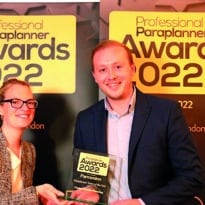Peter Mason, director of PJM Paraplanning and Consultancy Services, talked to Rob Kingsbury about his paraplanning journey, including transitioning into his own outsourced company and pension transfer specialist work
Peter Mason had been working in financial services for 26 years before he set up his own company, Birmingham-based PJM Paraplanning in April 2017.
It followed a career that started with a well-known pension provider, then as an in-house paraplanner and finally as a self-employed paraplanner, primarily for outsourced paraplanning businesses.
It was the level of work he was receiving as a self-employed paraplanner from the outsourced firms as well as growing demand from adviser firms looking to use his services to supplement their in-house paraplanning teams, that convinced him he should start his own business.
PJM Paraplanning and Consultancy Services offers general outsourced paraplanning services, as well as a Pension Transfer Specialist service delivered by Peter.
Initially starting on his own, he now has two highly qualified paraplanners working virtually for him, both of whom are Fellows of the PFS.
“Our work generally consists of providing a report writing service although invariably, this will include some research as well – such as fund and product research, annuity or life cover research,” he explains.
Peter looks to establish long-term business relationships with the adviser firms that he serves and as such, he says, he will tailor the service to the advisers’ needs.
“We do not have any restrictions on the type of work we take on, our work generally ranges from final salary transfers, pension switches and retirement planning to investment restructures and IHT planning, but if an adviser is seeking a report for an EIS or a VCT or more simplistic work such as setting up a pension or lump sum investment, then that is also within our capabilities.
“If holistic reports are required, then our service will be tailored to this, the same as if an adviser requires a full paraplanning service to include research, pre-meeting preparation and recommendation reports – we are more than happy to tailor this to the advisers requirements.”
This does not rule out undertaking ad hoc work, he adds, “we will help out where possible.
“What’s important is to provide good quality work in reasonable timescales. This will lead to more regular work,” he says.
From technical support to business owner
Peter started his career in 1991 for the pension provider, progressing through several roles leading to a technical support role that involved producing TVAS reports for financial advisers. During this time he sat G60 “as this was completely relevant to my role”.
He was with the company for over 13 years before switching from the provider side to working with financial advisers, in 2004. This was his step into paraplanning.
“I started working with a firm of independent financial advisers in a paraplanning role and that was a steep learning curve for me,” he admits. “The move from a pension provider to an IFA was a huge difference and one that I needed to adapt to quickly. I had a lot of pensions experience from working for a pensions provider for so long, but on moving to an IFA, I soon found that most of that experience related to the pension providers’ products, rather than market as a whole.”
Self-employed opportunities
Peter’s move to a self-employed position initially came about due to family circumstances requiring him to have very flexible working arrangements.
“It had never been my intention to go it alone but circumstances made this route attractive to me even though I knew it may come with several risks. However, this turned out to be the start of bigger and better things.”
He started off by working for a large outsourced paraplanning firm, concentrating on final salary reports. “They made the transition to self-employed a fairly smooth journey so it was not a large jump from employed to self-employed.”
Nevertheless, he says, it took a good couple of months to bed into the new role. “My first couple of months I took my time adapting to new procedures and processes. I quickly found you have to be careful with how you spend your time as it is quite easy to get caught up on the phone which then has a knock-on effect with timescales and, of course, earnings.”
His self-employed work quickly developed through existing contacts and referrals from advisers he was working with, so much so that he started building his own bank of clients.
“Within eight months of commencing trading, business levels were such that I decided to set up my own company,” he says.
Around the same time, he became a regulated individual under another company – Haven Global Strategies Limited – and was appointed as a chartered financial adviser/pension transfer specialist for the firm.
Peter has worked with various financial advisers and this has opened up further paraplanning opportunities, he says, “but the biggest opportunity this created was through being appointed as a pension transfer specialist. Now, whilst my paraplanning business is my priority and takes the majority of my time, the PTS role has opened up further opportunities for me.
“Whilst I deal with all areas of financial planning, my role as a pension transfer specialist works well alongside my paraplanning business, particularly as I am heavily involved on the paraplanning side with final salary transfers. It is now a regular part of my day both from a paraplanning and advice perspective.”
The challenges
Once Peter had been trading for around twelve months and had built up a reasonable number of clients, he found that his challenge was managing his workload and timescales.
“I had no problem doing the work as this is what I had done for the last 15 years in a paraplanning role but the difficulty was having sufficient hours in the day. There was no magical solution for dealing with the workload – it all came down to me and resulted in working a lot of hours to ensure I was meeting my timescales wherever possible.”
Clearly, this was not a sustainable business model, certainly not over the long term, so he looked to bring in the services of two self-employed paraplanners to help. “I now have two other higher level paraplanners working for me (both of whom are Fellows of the PFS) and this has helped to ease the workload.”
It has also given him some leeway to take on new long-term clients. “My aim is to continue to run an outsourced business that is manageable. I do not envisage taking on many more paraplanners but rather to work with a sufficient number of advisers that require regular support such that the paraplanners I do work with have as much as work as they desire.”
Another of the challenges has been getting to grips with running the business side of the company itself. “I have not run a business or a company before and there are several tasks and duties imposed on me which I did not anticipate or consider – such as what was needed to comply with HMRC and Pensions Regulator obligations and investing in IT services to ensure we are fully compliant with GDPR. However, I have been very well supported by my accountant which certainly helped in the early days.”
Working remotely, digital marketing has also proven to be an eye-opener, he says. “I had my website designed just over twelve months ago and I did not appreciate that this alone would not make my business any better known online. There is so much more to getting your website to work for you. I now make use of other resources to promote our services such as through ‘Search Engine Optimisation’ and social media.
Going it alone
Would he recommend that paraplanners set up as self-employed or run their own business?
“I absolutely would recommend it. I may not have taken the step if my circumstances had not dictated it but my only regret is that I did not do it sooner.”
There are arguments for and against the move, he says. “There is no doubt it is hard work. It can be very stressful as you are responsible for everything and it is easy for work to get out of hand and take over if it is not managed properly. But being your own boss, being rewarded directly for the effort and hard work that you put in and doing a job that you enjoy, most definitely makes it worthwhile in my opinion.”
More information on Peter’s company, PJM Paraplanning & Consultancy Services, can be found at: https://www.pjmparaplanning.co.uk/





























